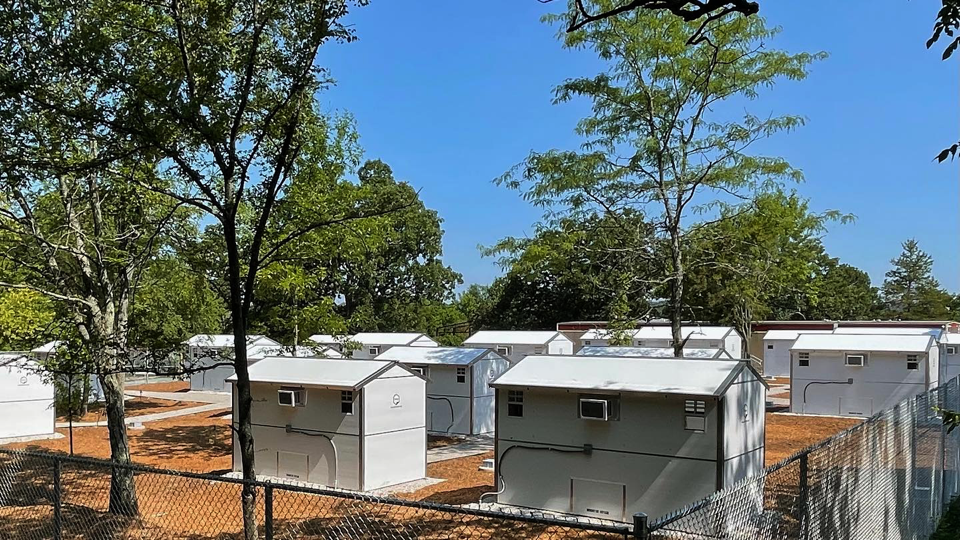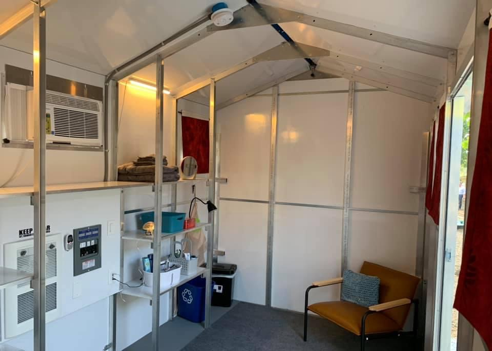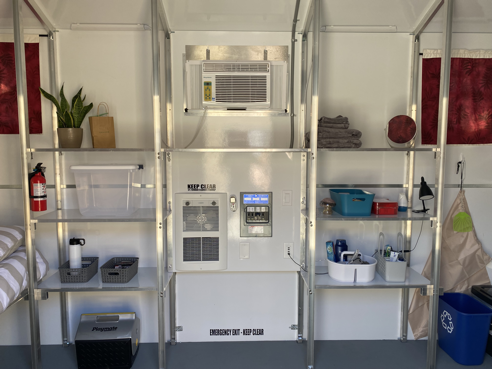Next Step wants to bring non-congregate housing to Fort Smith. How has it helped Fayetteville?

Next Step Homeless Services announced plans last month to relocate out of downtown Fort Smith with eyes set on a new type of community: non-congregate housing.
The potential location at 1400 South U St. would allow the organization to expand its services with shower and laundry facilities as well as additional space for medical care. The new location would also include a 30-unit non-congregate housing community.
The community would be the first of its kind for Fort Smith but not the first in the region. New Beginnings Bridge Housing Community opened in September 2021 with “twenty individual cabins and one communal ‘community center’ containing a commercial kitchen, shower house, laundry service, and meeting space,” according to the organization’s website.
Sharing about the plans for the relocation in December 2021, Sharon Chapman, executive director of Next Step, cited the New Beginnings Bridge Housing Community as an inspiration.
“Sometimes until a person who’s living on the street, until they can get into a situation where they feel safe and rested and clean and they’re not constantly looking over their back, until they get in a situation like that, it’s really hard for us to ask them to make big leaps forward in getting treatment and in making progress,” Chapman said. “We’re hoping that these types of units would allow them to rest and recuperate enough so that they’re more open to accepting the services that we can provide and that our community can provide.”
Kevin Fitzpatrick, a sociology professor at the University of Arkansas and the vice president and founder of New Beginnings NWA, says the community provides “a basic human right.”
The ‘Housing First’ strategy
With individual units, New Beginnings focuses on the strategy of "Housing First" - where individuals receive housing, meet their basic needs and find stability before starting the pathway to permanent housing, sobriety and employment.
Members of the New Beginning Bridge Housing Community receive housing without preconditions like treatment or service requirements, a different approach to homelessness as opposed to an emergency shelter.
“The thing about the majority of emergency shelters … [they] often times [have] high-barrier entrance and it also is very, very temporary, meaning that it does provide a place for individuals to stay over the night hours, but they’re put back out on the street during the day,” Fitzpatrick said.
Cold weather can shift a shelter’s policies, but often times it is the only option for people experiencing homelessness, Fitzpatrick said.
“What we had been arguing for the longest period of time here was that was never gonna be a pathway out of homelessness for most people,” he said. “Now, for some people, it could be, but for the chronic homeless person who has spent a lot of time unsheltered, in and out of emergency shelters is never going to be the solution.”
Through services provided by New Beginnings, residents can work towards permanent housing and a bright future while experiencing stability in the present, along with “security in a clean, safe environment where they are supported by services and actually have a lockable, physical space that they can call their own.”

Going from living and surviving on one’s own, often in harsh elements, to living in a community is a serious transition both physically and mentally. Fitzpatrick shared that even in just six months, he has witnessed remarkable personal accomplishments including obtaining IDs, SNAP benefits, employment, healthcare benefits and VA benefits.
Not only has the program changed individuals’ lives; it has also developed a strong, tight-knit community.
“People are cooperating and they’re connecting and they’re governing,” Fitzpatrick said. “They’re doing all the things that they do in a community … It’s developing social capital exactly in the way that social capital develops in the larger world.
“On a day-to-day basis, it looks like a neighborhood, it feels like a community and it’s probably a little tighter knit than a lot of our communities and neighborhoods.”

Transitioning out of the community is unique to each person’s needs, and it also has been complicated by a lack of affordable housing, Fitzpatrick said, a problem seen across the county. However, the organization is in it for the “long game.”
“We don’t believe releasing people into an apartment is the answer because they need follow-up,” he said. “They need support. That has to be part of the equation because it’s the long game that we’re interested in.”
With both personal gains and a developing community, New Beginnings aims to set people up for long-term success and thriving.
“That next step … it’s a big one,” Fitzpatrick said. “It’s as big as Neil Armstrong stepping down onto the moon for some of these people.”
This article originally appeared on Fort Smith Times Record: 'Housing First' communities create new support for homeless

